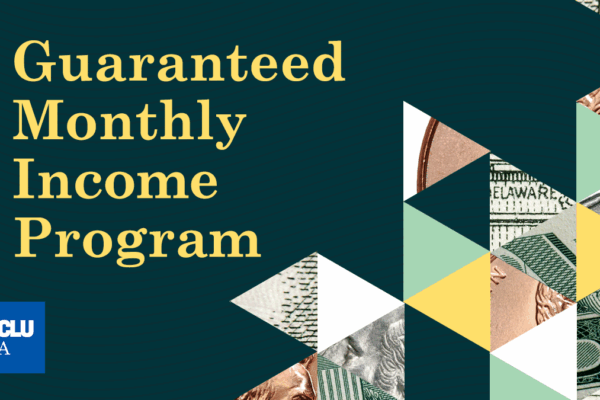A recent survey we conducted of participants in our Guaranteed Income pilot project has put numbers to the impact of discriminatory policing. Many of the participants are living with the effects of their interactions each day of their life; massive legal fees, lost income, missed opportunities, and on-going mental health issues and stress are some of the significant consequences that come from violent interactions with the police. Almost all said that they had spent tens of thousands of dollars over their lifetime into the criminal legal system--and these are individuals with monthly incomes of two thousand dollars or less.
However, the Guaranteed Income program aims to help bridge these gaps for participants and undo some of the harms created by discriminatory policing. Twelve participants receive $1,000 a month for twelve months, as well as wraparound services such as free counseling, expungement clinics, financial literacy and career services workshops. Within just one month, participants reported a remarkable 20% increase in overall life satisfaction.
The program’s initial month showcased the profound impact of guaranteed income on survivors of discriminatory policing, empowering them to regain control of their lives and begin restoring economic stability. This initiative provides families with financial tools, freedom, opportunities, and the means to work and care for loved ones.
Early results from the pilot are promising. Only about 60% of participants said they had to forgo necessary treatment, like doctors visits, because of costs, down from 85% from the previous month. Additionally, only a third of participants said they would not be able to pay for a $400 emergency expense, nearly a 50% decrease in just one month. Participants reported improved financial stability in meeting their needs in various categories, including grocery, housing, and healthcare.
Survey outcomes indicate that participants predominantly use their guaranteed income for essential monthly expenses such as utility bills, rent, mortgage payments, and debt reduction. The number of participants who reported being able to pay down non-mortgage debt increased from a quarter to over half in the program’s first month. According to one participant, the cash transfer “made things less stressful,” as they “didn’t have to go through borrowing as much” and only borrowed twice in the month. Another participant was able to pay their past due light bill with the additional income and got their lights reconnected.
Beyond feeling more economically secure, participants have also experienced positive mindset shifts since the program’s start. The average rating for mental health increased by 20 percent. One participant shared that the program over the past month has “lessened [their] depression, stress and anxiety, and some of the negativity [they had] been experiencing.” Others shared similar sentiments, crediting the program with providing financial relief and enabling clear, worry-free thinking.
For some participants, previously unmet obligations became easily manageable, with surplus funds emerging in some cases. Beyond addressing immediate needs, participants found themselves with the means to engage in additional meaningful activities. The most common self-reported expense behind basic necessities was Christmas gifts for loved ones. This shift highlights the enhancement in participants’ capacity to engage in meaningful expressions of care and generosity.
Unfortunately, a common misconception around wealth transfer initiatives is the belief that people facing financial challenges can’t be trusted to make their own choices. This notion contradicts the fundamental principles of freedom and dignity on which our country is built. Our survey findings clearly demonstrate that with economic stability and agency, individuals can go beyond bare necessities, enabling them to actively engage in their own lives and contribute to the lives of others.
We expect these results to continue as our participants take back some dignity in their lives. Many express hopes of starting or growing a business, paying off debts, or continuing their education. We will continue to update you as we obtain more results from the program and share progress and learnings from transferring wealth in service of restorative justice.



